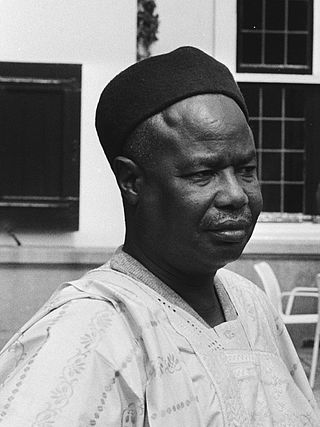| |||||
| Decades: | |||||
|---|---|---|---|---|---|
| See also: | Other events of 1991 List of years in Cameroon | ||||
Events in the year 1991 in Cameroon.
| |||||
| Decades: | |||||
|---|---|---|---|---|---|
| See also: | Other events of 1991 List of years in Cameroon | ||||
Events in the year 1991 in Cameroon.

Cameroon, officially the Republic of Cameroon, is a country in Central Africa. It shares boundaries with Nigeria to the west and north, Chad to the northeast, the Central African Republic to the east, and Equatorial Guinea, Gabon and the Republic of the Congo to the south. Its coastline lies on the Bight of Biafra, part of the Gulf of Guinea and the Atlantic Ocean. Due to its strategic position at the crossroads between West Africa and Central Africa, it has been categorized as being in both camps. Its nearly 27 million people speak 250 native languages and English or French or both.
October 2 is the 275th day of the year in the Gregorian calendar; 90 days remain until the end of the year.
1964 (MCMLXIV) was a leap year starting on Wednesday of the Gregorian calendar, the 1964th year of the Common Era (CE) and Anno Domini (AD) designations, the 964th year of the 2nd millennium, the 64th year of the 20th century, and the 5th year of the 1960s decade.

1924 (MCMXXIV) was a leap year starting on Tuesday of the Gregorian calendar, the 1924th year of the Common Era (CE) and Anno Domini (AD) designations, the 924th year of the 2nd millennium, the 24th year of the 20th century, and the 5th year of the 1920s decade.

Paul Biya is a Cameroonian politician who has served as the President of Cameroon since 6 November 1982, having previously been Prime Minister of Cameroon from 1975 to 1982. He is the second-longest-ruling president in Africa, the longest consecutively serving current non-royal national leader in the world and the oldest head of state in the world.

The Social Democratic Front is the main opposition party of Cameroon. It was led by Ni John Fru Ndi from its foundation until his death in 2023, and receives significant support from the Anglophone Southwest and Northwest Regions.

Ahmadou Babatoura Ahidjo was a Cameroonian politician who was the first President of Cameroon, holding the office from 1960 until 1982. Ahidjo played a major role in Cameroon's independence from France as well as reuniting the French and English-speaking parts of the country. During Ahidjo's time in office, he established a centralized political system. Ahidjo established a single-party state under the Cameroon National Union (CNU) in 1966. In 1972, Ahidjo abolished the federation in favor of a unitary state.
An attempted coup d'état occurred in Cameroon in 1984, when presidential palace guards unsuccessfully tried to overthrow President Paul Biya. The fighting that resulted began on April 6, 1984, and ended several days later. The coup attempt is widely viewed as one of the most crucial events in the history of Cameroon since independence in 1960.

Chantal Biya is the first lady of Cameroon.

Issa Hayatou is a Cameroonian sports executive, former athlete and football administrator best known for serving as the president of the Confederation of African Football (CAF) between 1988 and 2017. He served as the acting FIFA president until 26 February 2016 as previous president Sepp Blatter was banned from all football-related activities in 2015 as a part of the that year's FIFA corruption investigation. In 2002, he ran for president of FIFA but was defeated by Blatter. He is also a member of the International Olympic Committee (IOC).
Sadou Hayatou was a Cameroonian politician. Hayatou served as the 4th Prime Minister of Cameroon from 26 April 1991 to 9 April 1992.
Events from the year 1932 in France.
Events from the year 1885 in France.
Events from the year 1904 in France.
Events from the year 1934 in France.
Events in the year 1995 in Cameroon.
Events in the year 1992 in Cameroon.
Events in the year 1994 in Cameroon.